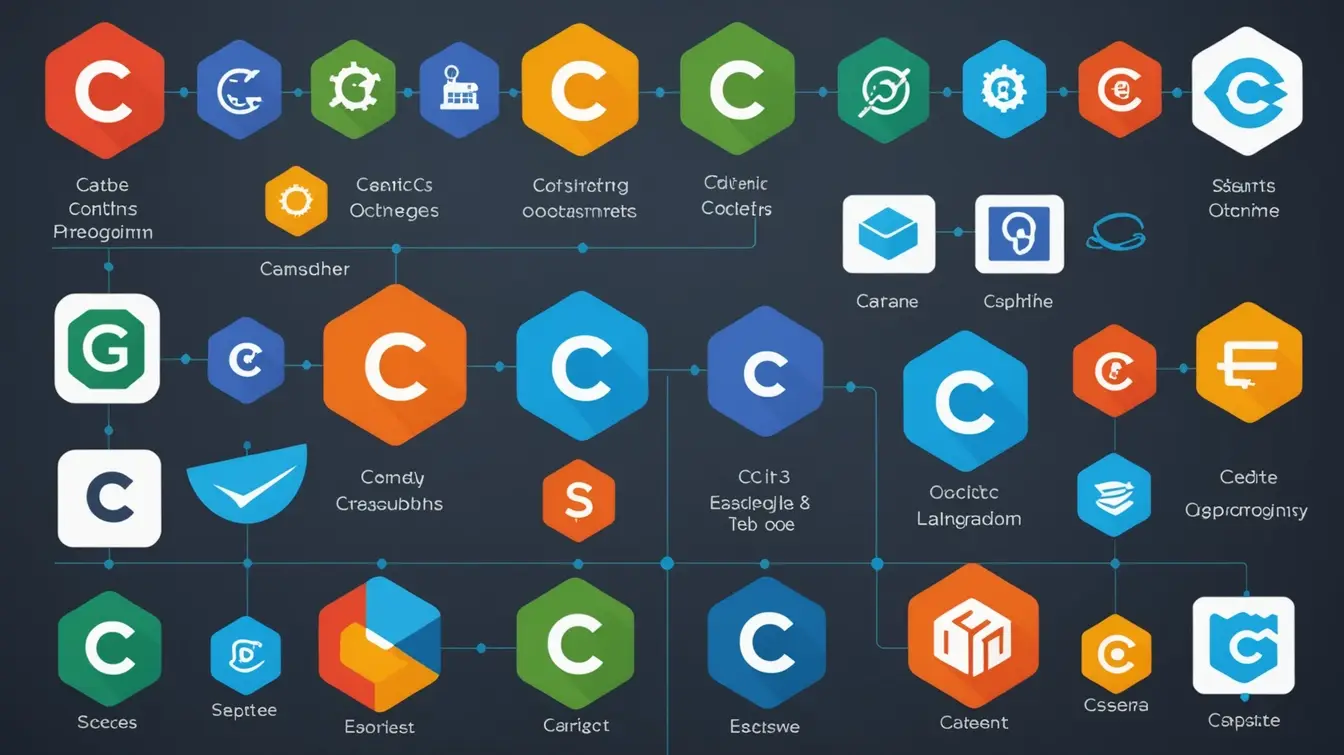At Mapsoft we use both C and C++. Generally, you can write most C code in a C++ environment. However, some of the libraries that we use are C based and so it is good to be aware of the rules and features of both languages. The Adobe PDF library that we use is still C based underneath, and yet we often have to use it in a C++ environment. See more information on our custom software development services. So let’s have a look at the difference between c programming and c++. In this article, we’ll also cover c and c++ programming.
1. Language Paradigm
1.1 C and C++ Programming
| Aspect | C | C++ |
|---|---|---|
| Primary Paradigm | Procedural Programming | Multi-Paradigm (Procedural, Object-Oriented, Generic, Functional) |
| Object-Oriented | Not Supported | Fully Supported (Classes, Inheritance, Polymorphism, Encapsulation) |
| Generic Programming | Limited (via macros) | Supported (Templates) |
Explanation:
- C is primarily a procedural language, focusing on functions and the sequence of actions.
- C++ extends C by supporting object-oriented and generic programming, allowing for more complex and reusable code structures.
2. Data Abstraction and Encapsulation
| Aspect | C | C++ |
|---|---|---|
| Data Structures | Structs (no methods) | Classes (with methods and access specifiers) |
| Encapsulation | Manual (using separate functions) | Built-in (private, protected, public) |
| Access Control | Not inherently supported | Supported through access specifiers |
Explanation:
- C++ introduces classes, allowing bundling of data and functions, and controlling access to data, enhancing data abstraction and encapsulation.
- C relies on structs and manual handling to achieve similar effects, without built-in access control.
3. Memory Management
| Aspect | C | C++ |
|---|---|---|
| Dynamic Memory | malloc, calloc, realloc, free | new, delete, new[], delete[] |
| Constructors/Destructors | Not Supported | Supported (automatically called) |
| RAII (Resource Acquisition Is Initialization) | Not Supported | Supported |
Explanation:
- C++ provides
newanddeleteoperators, constructors, and destructors, enabling better control over resource management through RAII. - C uses functions like
mallocandfreewithout automatic resource management.
4. Standard Libraries
| Aspect | C | C++ |
|---|---|---|
| Standard Library | C Standard Library (stdio.h, stdlib.h, etc.) | C++ Standard Library (STL: iostream, vector, map, etc.) |
| Input/Output | printf, scanf | Streams (std::cin, std::cout, std::cerr) |
| Containers | Not Available | Rich set (e.g., std::vector, std::list, std::map) |
Explanation:
- C++ offers the Standard Template Library (STL), providing a wide range of ready-to-use containers and algorithms.
- C has a more limited standard library focused on basic I/O and memory management.
5. Function Overloading and Default Arguments
| Aspect | C | C++ |
|---|---|---|
| Function Overloading | Not Supported | Supported |
| Default Arguments | Not Supported | Supported |
Explanation:
- C++ allows multiple functions with the same name but different parameters (overloading) and functions to have default parameter values.
- C requires each function to have a unique name, and all parameters must be provided when calling a function.
6. Exception Handling
| Aspect | C | C++ |
|---|---|---|
| Exception Handling | Not Supported | Supported (try, catch, throw) |
| Error Handling | Typically via return codes and errno | Exception mechanism provides structured error handling |
Explanation:
- C++ provides a robust exception handling mechanism, allowing for cleaner error handling.
- C relies on manual error checking, which can be more error-prone and less structured.
7. Namespace Support
| Aspect | C | C++ |
|---|---|---|
| Namespaces | Not Supported | Supported (namespace keyword) |
| Name Collision | More prone due to global scope | Mitigated through namespaces |
Explanation:
- C++ uses namespaces to organize code and prevent name collisions.
- C lacks native namespace support, making large projects more susceptible to naming conflicts.
8. Type Safety and Casting
| Aspect | C | C++ |
|---|---|---|
| Type Safety | Less Strict | More Strict |
| Casting | C-style casts ((type)variable) | C++ casts (static_cast, dynamic_cast, const_cast, reinterpret_cast) |
| Function Overloading | Not Supported | Supported |
Explanation:
- C++ offers more type-safe casting mechanisms, reducing the risk of errors.
- C uses simpler but less safe casting methods.
9. Templates and Generics
| Aspect | C | C++ |
|---|---|---|
| Templates | Not Supported | Supported (Function and Class Templates) |
| Generics | Limited via Macros | Strongly Supported via Templates |
Explanation:
- C++ templates enable writing generic and reusable code.
- C lacks built-in generics, relying on macros which are less type-safe and harder to debug.
10. Inline Functions
| Aspect | C | C++ |
|---|---|---|
| Inline Functions | Supported (since C99) | Supported |
| Usage and Flexibility | Limited compared to C++ | More Flexible and Integrated with OOP |
Explanation:
- Both languages support inline functions, but C++ integrates them more seamlessly with other features like classes and templates.
11. Multiple Inheritance
| Aspect | C | C++ |
|---|---|---|
| Inheritance | Not Applicable | Supported (including multiple inheritance) |
| Complexity | N/A | Can lead to complexity and the “Diamond Problem” |
Explanation:
- C++ allows classes to inherit from multiple base classes, providing greater flexibility but also introducing potential complexity.
- C does not support inheritance as it is not an object-oriented language.
12. Standard Input/Output
| Aspect | C | C++ |
|---|---|---|
| I/O Mechanism | Procedural (printf, scanf) | Stream-based (std::cout, std::cin) |
| Formatting | Format specifiers | Type-safe and extensible through operator overloading |
Explanation:
- C++ stream-based I/O is generally considered more type-safe and flexible compared to C’s procedural I/O functions.
13. Performance
| Aspect | C | C++ |
|---|---|---|
| Execution Speed | Generally faster due to simplicity | Comparable to C; slight overhead in some OOP features |
| Optimization | Easier to optimize for low-level operations | High-level abstractions may introduce complexity, but modern compilers optimize efficiently |
Explanation:
- Both languages are compiled to efficient machine code. C++‘s abstractions can sometimes introduce minor overhead, but with proper use, performance is often comparable to C.
14. Use Cases
| Aspect | C | C++ |
|---|---|---|
| System Programming | Operating systems, embedded systems | Also used, especially where object-oriented features are beneficial |
| Application Development | Less Common | Widely Used (Games, GUI applications, Real-time systems) |
| Performance-Critical Applications | Common in high-performance computing | Also Common, with added abstraction capabilities |
Explanation:
- C is preferred for low-level system components and embedded systems due to its simplicity and close-to-hardware capabilities.
- C++ is favored for applications requiring complex data structures, object-oriented design, and high performance, such as game development and real-time simulations.
15. Compatibility
| Aspect | C | C++ |
|---|---|---|
| Code Compatibility | C code can be integrated into C++ projects | C++ code is not directly compatible with C |
| Interoperability | Easier to call C functions from C++ | Requires extern "C" linkage for C functions |
Explanation:
- C++ was designed to be compatible with C to a large extent, allowing C code to be used within C++ projects. However, the reverse is not true due to C++’s additional features.
16. Example Comparison
To better understand the differences, here’s a simple example of a program that prints “Hello, World!” in both C and C++.
C Example:
#include <stdio.h>
int main() {
printf("Hello, World!\n");
return 0;
}
C++ Example:
#include <iostream>
int main() {
std::cout << "Hello, World!" << std::endl;
return 0;
}
Key Differences:
- C uses
printffor output, which requires format specifiers. - C++ uses
std::cout, which is type-safe and integrates seamlessly with other C++ features like operator overloading.
17. Summary Table
| Feature | C | C++ |
|---|---|---|
| Programming Paradigm | Procedural | Multi-Paradigm (OOP, Generic, etc.) |
| Data Abstraction | Structs without methods | Classes with methods and access control |
| Memory Management | malloc/free | new/delete, Constructors/Destructors |
| Standard Library | Limited (stdio, stdlib) | Extensive (STL: vectors, maps, etc.) |
| Function Overloading | Not Supported | Supported |
| Exception Handling | Not Supported | Supported (try, catch, throw) |
| Namespaces | Not Supported | Supported |
| Templates/Generics | Not Supported | Supported |
| Inheritance | Not Applicable | Supported (including multiple) |
| I/O Mechanism | printf/scanf | std::cout/std::cin |
| Performance | Highly Efficient | Comparable, with slight abstraction overhead |
| Use Cases | System programming, embedded systems | Application development, game development, real-time systems |
| Code Compatibility | C can be used within C++ projects | C++ cannot be directly used in C |
18. Choosing Between C and C++
| Criteria | Choose C | Choose C++ |
|---|---|---|
| Project Type | Low-level system components, embedded systems | Complex applications requiring OOP, real-time simulations, game development |
| Performance Needs | Maximum control over hardware and memory | High performance with abstraction capabilities |
| Developer Expertise | Familiarity with procedural programming | Expertise in object-oriented and generic programming |
| Library Requirements | Minimalistic libraries | Rich Standard Template Library (STL) and third-party libraries |
Explanation:
- C is ideal for projects where low-level hardware interaction and maximum performance are critical.
- C++ is better suited for projects that benefit from high-level abstractions, object-oriented design, and extensive library support.
19. Further Reading and Resources
To deepen your understanding of C and C++, consider exploring the following resources:
Books:
- The C Programming Language by Brian W. Kernighan and Dennis M. Ritchie
- C++ Primer by Stanley B. Lippman, Josée Lajoie, and Barbara E. Moo
- Effective C++ by Scott Meyers
Online Tutorials:
By leveraging these tables and explanations, you should have a clear understanding of the fundamental differences between C and C++. Both languages have their unique strengths and are powerful tools in a developer’s toolkit.
See more information on our custom development services.



